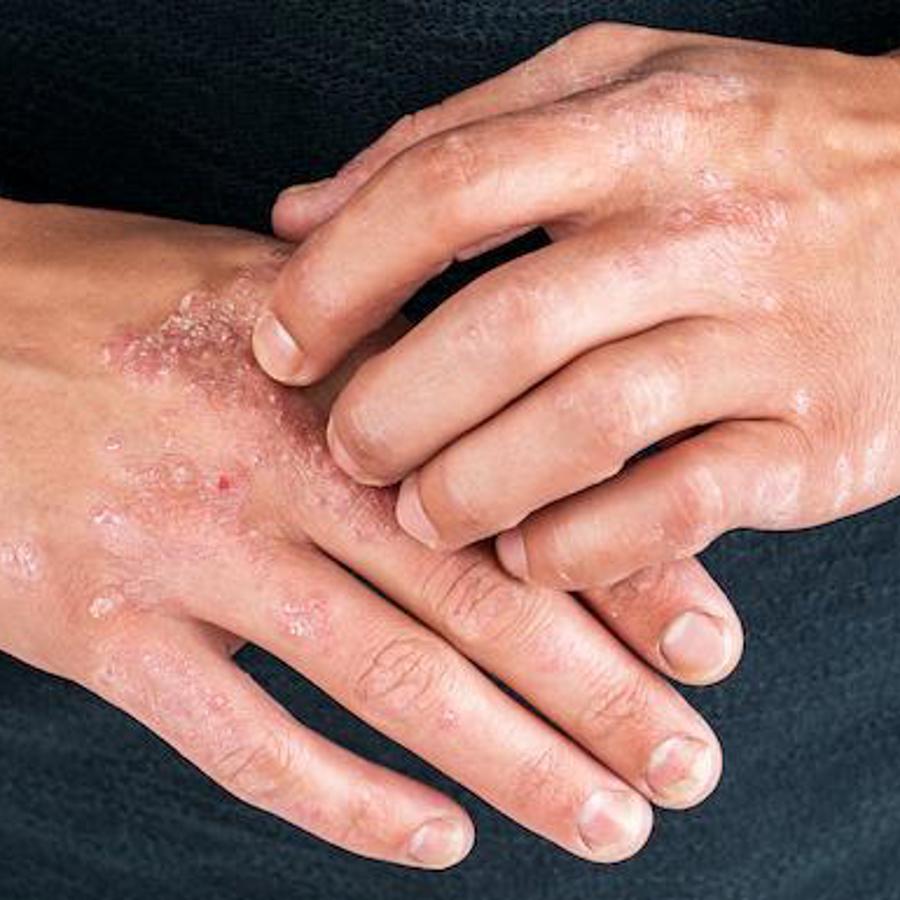
Is eczema a genetic disease?
February 10, 2006

- Related Topics:
- Complex traits,
- Autoimmune disease,
- Medical genetics
A high school student from California asks:
"Is eczema a genetic disease?"
Some types of eczema do certainly tend to run in families. And scientists have identified genes that can make it more likely you'll develop eczema. So, yes, at least some forms of eczema are genetic.
What is eczema?
I am very familiar with eczema myself since I have it. Eczema describes a broad range of skin problems that result in rashes that are itchy, hot, and sometimes blistered if scratched.
The two major types of eczema are atopic and contact. Atopic eczema is the form that tends to run in families. Contact eczema is where a certain object, such as a piece of clothing or jewelry, causes a rash to form.
Atopic eczema is the most common skin condition in children. It is caused by an overactive immune system. The skin of people with eczema reacts badly to dry conditions or dirt and becomes red and itchy. Normal everyday factors such as sweat, clothing, and drying can cause an outbreak of rashes.
If this sounds a lot like what happens with allergies and asthma, you're right. This is why people with atopic eczema often suffer from asthma and hay fever as well. Their lungs and noses overreact to harmless stuff.
Genetics and eczema
So what does this have to do with genetics? Well, genes play a big part in determining what our immune system will react to and how strongly.
So people with atopic eczema must have a gene that causes the disease, right? Well, it isn't so simple.
Our immune system is set up and controlled by lots and lots of genes. What this means is that more than one gene can cause atopic eczema (or asthma or hay fever). You have to get the right combination of genes to get eczema.
This is why it is so hard to predict whether eczema will be passed down or not. And why it seems to appear out of nowhere sometimes.

With "simpler" diseases like cystic fibrosis and sickle cell anemia, only one gene is involved. This gene comes in two forms — a “disease” version and a “healthy” version.
To get the disease, both of your copies of the gene need to be the disease version (remember, we have two copies of most of our genes — one from each parent). When more than one gene is involved, the situation gets much more complicated pretty quickly.
For a complicated disease like eczema, though, you need to get the disease version of many genes from both parents. And they are not always the same genes — different gene combinations can lead to the same disease. This is one of the reasons a genetic test for eczema isn't coming out anytime soon.
Other causes of eczema
And to complicate matters further, genes aren't usually the whole story. Sometimes something in the environment has to trigger the reaction.
Because of this, some people can avoid itchy skin by avoiding the triggers. For some people it can be something as simple as making sure their skin is not dry and by wearing loose clothing.
So as you can see, atopic eczema certainly has a genetic part. But this isn't the whole story. What about the other major form of eczema, contact eczema?
With contact eczema, skin rashes are linked to specific allergic reactions. For example, a rash forms when a particular material, such as a new soap, is used on the skin or new jewelry is worn.
Unlike atopic eczema, those people with contact eczema don't generally have skin problems. They get skin rashes only when they touch something they are allergic to.
But is contact eczema genetic? Does it run in families too? Unlike the atopic form, contact eczema doesn't seem to run in families.
Common treatments of eczema include moisturizing creams, which prevent drying of the skin. Steroid skin creams can also be used as they can help calm down the immune system.
Having said all of this, most doctors don't think of eczema as a genetic disease, but more as a skin problem that can sometimes be inherited. Genetic diseases are those medical conditions that have a strong link to a specific gene or a small number of genes.

Author: Dr. David Tran
When this answer was published in 2006, David was a postdoctoral fellow in the Department of Biology, studying the neurobiology of drosophila courtship behavior in Bruce Baker's laboratory. David wrote this answer while participating in the Stanford at The Tech program
 Skip Navigation
Skip Navigation
